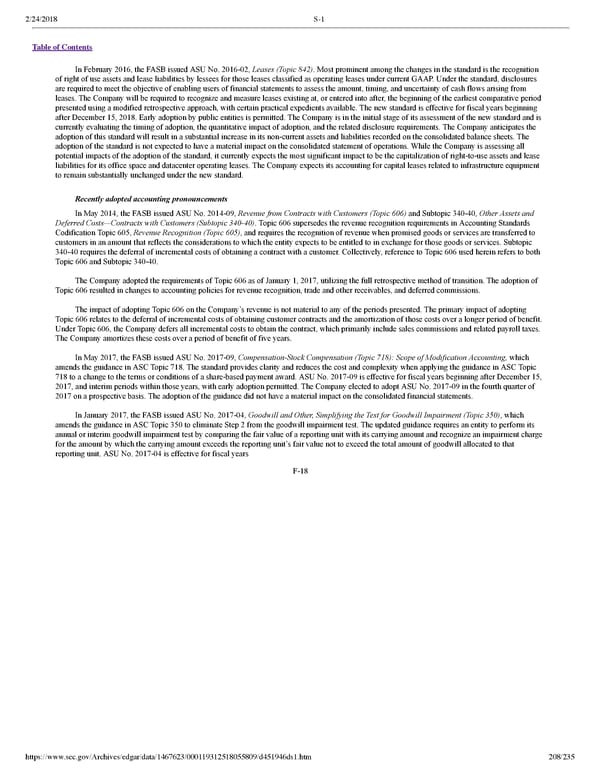2/24/2018 S-1 Table of Contents In February 2016, the FASB issued ASU No. 201602, Leases (Topic 842). Most prominent among the changes in the standard is the recognition of right of use assets and lease liabilities by lessees for those leases classified as operating leases under current GAAP. Under the standard, disclosures are required to meet the objective of enabling users of financial statements to assess the amount, timing, and uncertainty of cash flows arising from leases. The Company will be required to recognize and measure leases existing at, or entered into after, the beginning of the earliest comparative period presented using a modified retrospective approach, with certain practical expedients available. The new standard is effective for fiscal years beginning after December 15, 2018. Early adoption by public entities is permitted. The Company is in the initial stage of its assessment of the new standard and is currently evaluating the timing of adoption, the quantitative impact of adoption, and the related disclosure requirements. The Company anticipates the adoption of this standard will result in a substantial increase in its noncurrent assets and liabilities recorded on the consolidated balance sheets. The adoption of the standard is not expected to have a material impact on the consolidated statement of operations. While the Company is assessing all potential impacts of the adoption of the standard, it currently expects the most significant impact to be the capitalization of righttouse assets and lease liabilities for its office space and datacenter operating leases. The Company expects its accounting for capital leases related to infrastructure equipment to remain substantially unchanged under the new standard. Recently adopted accounting pronouncements In May 2014, the FASB issued ASU No. 201409, Revenue from Contracts with Customers (Topic 606) and Subtopic 34040, Other Assets and Deferred Costs—Contracts with Customers (Subtopic 34040). Topic 606 supersedes the revenue recognition requirements in Accounting Standards Codification Topic 605, Revenue Recognition (Topic 605), and requires the recognition of revenue when promised goods or services are transferred to customers in an amount that reflects the considerations to which the entity expects to be entitled to in exchange for those goods or services. Subtopic 34040 requires the deferral of incremental costs of obtaining a contract with a customer. Collectively, reference to Topic 606 used herein refers to both Topic 606 and Subtopic 34040. The Company adopted the requirements of Topic 606 as of January 1, 2017, utilizing the full retrospective method of transition. The adoption of Topic 606 resulted in changes to accounting policies for revenue recognition, trade and other receivables, and deferred commissions. The impact of adopting Topic 606 on the Company’s revenue is not material to any of the periods presented. The primary impact of adopting Topic 606 relates to the deferral of incremental costs of obtaining customer contracts and the amortization of those costs over a longer period of benefit. Under Topic 606, the Company defers all incremental costs to obtain the contract, which primarily include sales commissions and related payroll taxes. The Company amortizes these costs over a period of benefit of five years. In May 2017, the FASB issued ASU No. 201709, CompensationStock Compensation (Topic 718): Scope of Modification Accounting, which amends the guidance in ASC Topic 718. The standard provides clarity and reduces the cost and complexity when applying the guidance in ASC Topic 718 to a change to the terms or conditions of a sharebased payment award. ASU No. 201709 is effective for fiscal years beginning after December 15, 2017, and interim periods within those years, with early adoption permitted. The Company elected to adopt ASU No. 201709 in the fourth quarter of 2017 on a prospective basis. The adoption of the guidance did not have a material impact on the consolidated financial statements. In January 2017, the FASB issued ASU No. 201704, Goodwill and Other, Simplifying the Test for Goodwill Impairment (Topic 350), which amends the guidance in ASC Topic 350 to eliminate Step 2 from the goodwill impairment test. The updated guidance requires an entity to perform its annual or interim goodwill impairment test by comparing the fair value of a reporting unit with its carrying amount and recognize an impairment charge for the amount by which the carrying amount exceeds the reporting unit’s fair value not to exceed the total amount of goodwill allocated to that reporting unit. ASU No. 201704 is effective for fiscal years F18 https://www.sec.gov/Archives/edgar/data/1467623/000119312518055809/d451946ds1.htm 208/235
 Dropbox S-1 | Interactive Prospectus Page 207 Page 209
Dropbox S-1 | Interactive Prospectus Page 207 Page 209